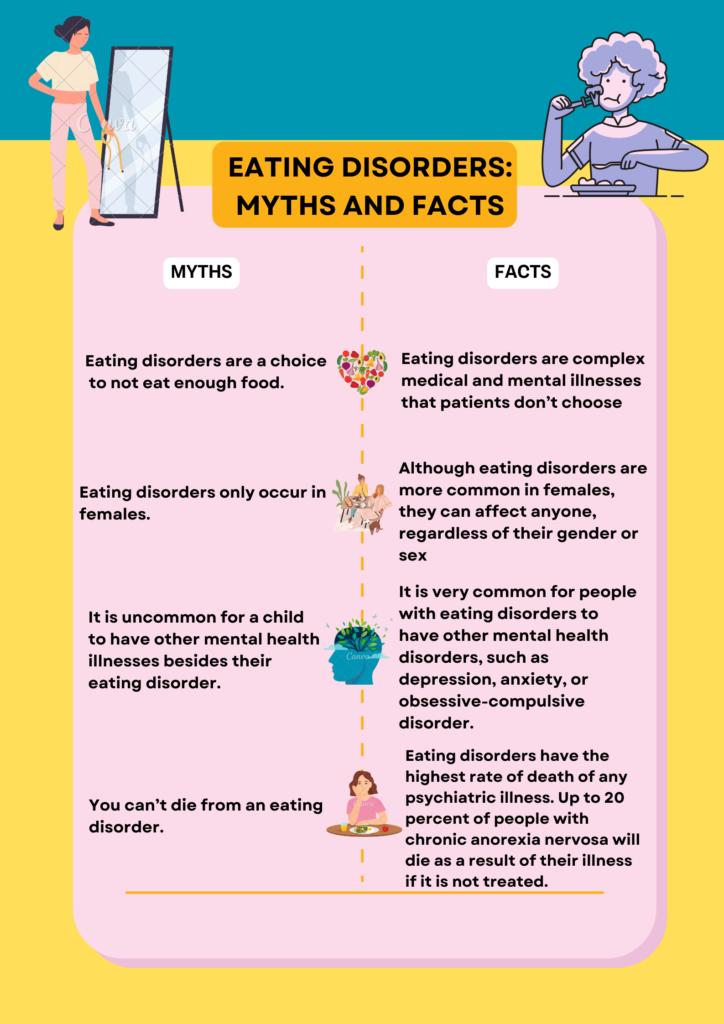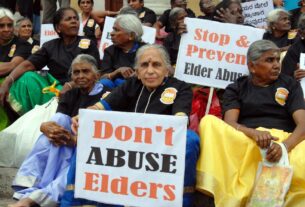In India, at least 50 percent of patients with an Eating Disorder (ED) have a psychological disorder, with depression being the most common, according to PubMed Central.
For Radha, an employee at a private firm in India, food had become displeasing and depressing. She felt that the thing that would sustain her would also make her look unappealing and ugly. She gradually reduced her intake from three meals a day to one, and could not resist the urge to puke afterwards.
Priya (name changed), a student from Bangalore said she had trouble eating because of overthinking. She elaborated that every time she would want or need to eat something, her mind would automatically think of the repercussions of the food. She clarified that she did not worry about gaining weight, but had a feeling the food would not be ingested properly in the body and she would fall ill.
“Hence, although I did not starve my body, I would only eat the bare minimum, just for sustenance,” she said.
Radha and Priya are two of around 35,000 female patients with an Eating Disorder in India. Clinical psychologist Dr. Akanksha Pandey, founder and director of a mental healthcare organization in Bangalore defined eating disorders (EDs) as serious psychological condition characterized by abnormal eating habits that adversely affect a person’s physical and mental health, and at times, can even be life threatening.
Dr. Pandey explained that EDs, can be fatal in cases when the patient starves their body completely, or has suicidal tendencies. “In most cases, due to lack of sufficient nutrition in the body, the patient’s immune response is compromised; which can harm the body’s functioning to a large extent leading to organ failure, and eventual death.” She added that obesity in patients caused by an ED can make them vulnerable to cardiac arrests.
The dietary choices of vegan raw food influencer, Zhanna Samsonova caused her death in July, 2023. According to dieticians quotes by news reports, Samsonova’s fruit and seed sprout-based diet, and an obsession with being thin, led to malnourishment and eventual death.
According to a research article published by the Indian Journal of Psychiatry (IJP) in Jan. 2024, 18 percent to 50 percent of children and 27 percent to 29.7 percent of women (including pregnant women) in India suffer from an ED. About 29 percent of adolescent girls in India suffer from an ED, according to another article by PubMed Central. From talking to psychiatrists practicing in India, the authors of the IJP article find the prevalence of EDs to be increasing in India.
Radha said she suffered from bulimia when she was in high school and during the first few months of her college. “I was bent on keeping my body a certain way. I did not want to eat much. But I knew my parents would not let me skip food. So, I often deliberately vomited the food out after eating,” she said. She added that it was especially true when her family (or friends) would eat outside or eat fast food.
Recollecting her experiences she said that she was frequently bullied as a teenager for being fat. “And it didn’t stop there. My cousins would ridicule my eating habits and food preferences and the kind of clothes I wore,” she said.
“This continued until I fainted one day and had to be taken to hospital, where doctors diagnosed me with low haemoglobin levels. I was put on a glucose drip for almost three days,” she said.
She added that she could recover from the disorder only through medical and therapeutic interventions and consultations with psychologists.
Dr. Pandey explained that Anorexia Nervosa, Bulimia Nervosa and Binge eating Disorder are the most prevalent types of EDs in India. Anorexia Nervosa is characterized by a disruptive body image, a consistent fear of weight gain which leads to a continuous reduction in food intake, resulting in low body weight and malnutrition, she said. In BuIimia Nervosa, binge eating episodes are followed by voluntary behaviors such as self-induced vomiting, the use of laxatives, or excessive exercise, so as to purge the food out of the body, she elaborated. Finally, she said, individuals with Binge Eating Disorders cannot help but keep consuming food, often to cope with some other troublesome aspect of their lives.
“All such disorders have several unwanted and serious effects on mental and physical health such as osteoporosis, cardiovascular disease, depression, obsessive-compulsive disorder, gastrointestinal imbalances and obesity or undernourishment,” she explained.
In India, eating disorders, despite being serious medical ailments do not get documented by the National Mental Health Surveys of India, according to the author of Eating Disorders in India: A Systematic Review published in the Acta Neurophysiologica journal. Additionally, an article published in IJP hints that one reason why perception and knowledge about EDs is low in India is because of the limited focus on research on Eating Disorders.
Dr. Shalini Poddar, clinical psychologist at the mental wellness center, Sprihaa in Bangalore believed that eating disorders are largely underplayed in India, just like any other psychological disease or disorder.
“EDs often go unnoticed, even by the patient themselves. They will not realize that by not wanting to eat or wanting to eat beyond contentment, they are harming their bodies. Most patients I have diagnosed with an Eating Disorder think it is a physical health problem and has something to do with digestive issues, which is not true,” she explained.

She further added that in both Bangalore and in Kolkata (where too she practices), most patients with an ED fall between the age of 12 to 16 years, and present with Body Dysmorphic Disorder almost always. She added that parents or guardians of such patients are often unaware of the psychological states their wards are in. “Indian parents will most often scold or punish their children for not eating enough, eating too much or skipping meals. Most of them do not consider that our intake of food is very closely related to the mental state we are in,” she said.
Dr. Akanksha spoke along the same lines. She said, “In today’s day and age, most teens feel the need to hide their thoughts from their guardians. They are also increasingly concerned about how their body looks. Hence, they normalize eating disorders within themselves, while suffering from other mental disorders like depression, Obsessive Compulsive Disorder (OCD) and anxiety.”
The National Mental Health Survey of India (2015-16) shows that approximately 40 percent to 90 percent of adolescents with depression suffer with additional comorbidities such as anxiety disorders, conduct disorders, substance abuse, or personality disorders.
However, EDs are not restricted to adolescents, according to Chaitra N, Rehabilitation Manager at Asha Halfway Home, a rehabilitation center and health NGO in Bangalore. She said that patients of all ages exhibiting EDs are present at the center.
Research indicates that the COVID-19 pandemic has been associated with worsening mental health among teens, including increasing numbers of patients with eating disorders, as reported by The Indian Express.
Dr. Gowri Iyer, Assistant Professor at the Indian Institute of Public Health, Hyderabad said that EDs will remain under addressed and unaddressed in India as long as there is less importance given to mental health disorders. Taking stock of the situation through better and more frequent national surveys focused on mental health are imperative. “Additionally, educational community campaigns on EDs, support groups and helplines are necessary and effective,” she said.
She further said that close monitoring, nutritional therapy, psychotherapy, counseling and body image therapy are some ways to combat eating disorders.




